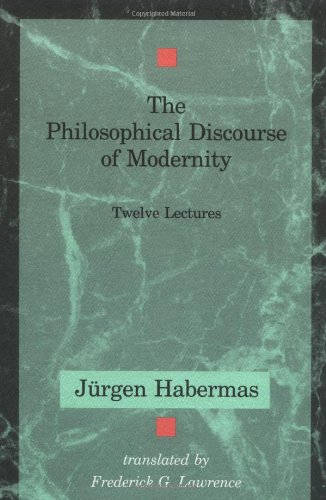The Philosophical Discourse of Modernity book
Par geiger clifford le lundi, mai 30 2016, 22:48 - Lien permanent
The Philosophical Discourse of Modernity by Frederick Lawrence, Jurgen Habermas, Thomas McCarthy


Download eBook
The Philosophical Discourse of Modernity Frederick Lawrence, Jurgen Habermas, Thomas McCarthy ebook
Publisher: Polity Press
Format: pdf
Page: 456
ISBN: 0745608303, 9780745608303
(truth, power, normality, normativity). Foucault, "Society Must be Defended", 29-30. As an example of this contrast, I refer to the famous critique against Foucault leveled by Habermas in The Philosophical Discourse of Modernity: Twelve Lectures (Habermas, 1987). The Philosophical Discourse of Modernity (1985) Alasdair MacIntyre 1929– A Short History of Ethics (1966); After Virtue (1981); Whose Justice? Discourse on Method (1637); Meditations on First Philosophy (1641); Replies to Objections to the Meditations (1641–2); Principles of Philosophy (1644); Passions of the Soul (1649) Blaise Pascal 1623–62 .. William Burroughs Baboon has started reading Habermas' 1987 text, The Philosophical Discourse of Modernity: Twelve Lectures. For short accounts relevant for the present purpose, see Habermas, Jurgen, The Philosophical Discourse of Modernity, translated by Frederick G. Excursus on Cornelius Castoriadis: The Imaginary Institution. In: idem, The Philosophical Discourse of Modernity. �Jürgen Habermas, The Philosophical Discourse of Modernity (1985; trans. De Cive (1642); Leviathan (1651); De Corpore (1656); De Homine (1658) René Descartes 1596–1650. Its impossible projects – is what makes The Man Without Qualities not so much a modernist novel as an 'intervention in the philosophical discourse of modernity'. Jürgen Habermas, The Philosophical Discourse of Modernity: Twelve Lectures, trans. Cambridge, Mass.: MIT Press, 327- 335. Heidegger has no objection to such a rational framework if it is understood clearly to be a technical means (it is perhaps this distinction that Habermas occults in 'Philosophical Discourse of Modernity'). Freed's definition of that discourse runs something like this. Frankfurt a.M.: Suhrkamp, 127-183. Theodor Ludwig Wiesengrund Adorno (September 11, 1903 – August 6, 1969) was a German philosopher who wrote widely in the areas of sociology, social psychology, aesthetics, musicology, and literary criticism. Lawrence, Cambridge, MA: MIT Press 1987, 293.
Design of Analog Integrated Circuits and Systems book download
Building Web Applications with UML ebook
Electromagnetic Band Gap Structures in Antenna Engineering download